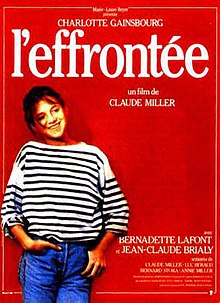L'Effrontée
| An Impudent Girl | |
|---|---|
 |
|
| Directed by | Claude Miller |
| Produced by | Marie-Laure Reyre |
| Written by | Claude Miller Luc Béraud Bernard Stora Annie Miller |
| Starring | Charlotte Gainsbourg |
| Music by | Alain Jomy |
| Cinematography | Dominique Chapuis |
| Edited by | Albert Jurgenson |
| Distributed by | Cinema National de la Cinématographie/Films Antenne 2/Monthyon Films/Oliane Productions/Telema Productions |
|
Release date
|
|
|
Running time
|
96 minutes |
| Country | France |
| Language | French |
An Impudent Girl (French: L'Effrontée) is a 1985 French film directed by Claude Miller. It stars Charlotte Gainsbourg, who won the César Award for Most Promising Actress, and Bernadette Lafont, who won the César Award for Best Actress in a Supporting Role. It is a free adaptation of the novel Frankie Addams (French title of Carson McCullers's The Member of the Wedding).
The film won the Louis Delluc Prize, and received César nominations for Best Film, Best Director, Most Promising Actor, Best Writing, Best Costume Design and Best Sound.
Charlotte Castang is a working-class 13-year-old girl, who lives in a drab, run-down neighbourhood, and is ready to become an adult. She has been raised without a mother, and lives with her crass brother and her father, whose attention is elsewhere. Her only friend is Lulu, a sick 10-year-old pest she would like to be rid of. Charlotte is bored and dreams of a better life, and her life improves when she meets Clara Bauman, a pianist from the other side of the tracks, whom she admires. Charlotte wants to be friends with Clara, whom she sees as her ticket out of the area, while the sophisticated Clara jokingly suggests that Charlotte should become her manager.
The film was seen as a return by Claude Miller to the material of his first feature, The Best Way to Walk. Miller:
I'm fascinated by those violent passions that make you ready to cut your throat for something you believe in, passions that, for better or worse, lose their edge as you grow older. In An Impudent Girl though the conflict is much less violent than the humiliation and hurt of The Best Way to Walk. The main character comes out of it very well, in fact it's certainly my most optimistic film. I wasn't trying to show a terrible drama, just one of those ordinary events which happen to all adolescents and shape us for life. I'm the proof because I still remember those tiny episodes that ended up affecting me more deeply than I ever realised at the time.
...
Wikipedia
